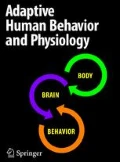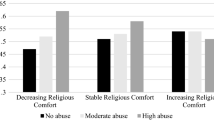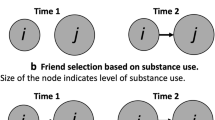Abstract
Objectives
Studies based on the “challenge hypothesis” have linked men’s androgens—testosterone and DHEA—to short term mating and antisocial behaviors. Causal direction at a given stage of the life cycle remains ambiguous. Religion is a major social institution through which actions violating social norms are controlled. Thus, ties to this institution may be lower among men with higher androgen levels. The present study queried these linkages.
Procedures
Data were from the 2005–2006 and 2010–2011 waves of the National Social Life, Health and Aging Project (NSHAP), a national probability sample of older U.S. adults. Analysis was through autoregressive cross-lagged panel models (minimum N = 1071).
Results
Higher baseline levels of both testosterone and DHEA prospectively predicted religious ties, whether measured through attendance at services or network connections to clergy. Moreover, contrary to arguments of sociocultural modulation of androgens, the pattern of associations was most consistent with hormonal causation of religious connections. Results were robust to a range of time invariant and time varying confounders, including demographics, hormone supplements, and physical health.
Conclusions
Findings add to the growing evidence that religiosity may have physiological and not simply psychosocial roots. Implications for hormonal confounding of previously published religion-deviance linkages, and for neuroendocrine underpinnings of population-level social and cultural patterns, are discussed.

Similar content being viewed by others
References
Archer, J. (2006). Testosterone and human aggression: An evaluation of the challenge hypothesis. Neuroscience & Biobehavioral Reviews, 30, 319–345. https://doi.org/10.1016/j.neubiorev.2004.12.007.
Aromaki, A. S., Lindman, R. E., & Eriksson, C. J. P. (1999). Testosterone, aggressiveness, and antisocial personality. Aggressive Behavior, 25, 113–123. https://doi.org/10.1002/(sici)1098-2337(1999)25:2<113::aid-ab4>3.3.co;2-w.
Becker, J. B., Berkley, K. J., Geary, N., Hampson, E., Herman, J., & Young, E. (Eds.). (2008). Sex differences in the brain: From genes to behavior. New York: Oxford University Press.
Berenbaum, S. A., Blakemore, J. E. O., & Beltz, A. M. (2011). A role for biology in gender-related behavior. Sex Roles, 64, 804–825. https://doi.org/10.1007/s11199-011-9990-8.
Bradshaw, M., & Ellison, C. G. (2009). The nature-nurture debate is over, and both sides lost! Implications for understanding gender differences in religiosity. Journal for the Scientific Study of Religion, 48, 241–251. https://doi.org/10.1111/j.1468-5906.2009.01443.x.
Bradshaw, M., & Ellison, C. G. (2010). Financial hardship and psychological distress: Exploring the buffering effects of religion. Social Science & Medicine, 71, 196–204. https://doi.org/10.1016/j.socscimed.2010.03.015.
Buck, A. C., Williams, D. R., Musick, M. A., & Sternthal, M. J. (2009). An examination of the relationship between multiple dimensions of religiosity, blood pressure and hypertension. Social Science & Medicine, 68, 314–322. https://doi.org/10.1016/j.socscimed.2008.10.010.
Carré, J. M., & Olmstead, N. A. (2015). Social neuroendocrinology of human aggression: Examining the role of competition-induced testosterone dynamics. Neuroscience, 286, 171–186. https://doi.org/10.1016/j.neuroscience.2014.11.029.
Cook, E. A., Jelen, T. G., & Wilcox, C. (1992). Between two absolutes: Public opinion and the politics of abortion. Boulder, CO: Westview.
Cornwell, B., Laumann, E. O., & Schumm, L. P. (2008). The social connectedness of older adults: A national profile. American Sociological Review, 73, 185–203. https://doi.org/10.1177/000312240807300201.
Crosnoe, R., & Elder Jr., G. H. (2002). Successful adaptation in the later years: A life course approach to aging. Social Psychology Quarterly, 65, 309–328. https://doi.org/10.2307/3090105.
Curran, P. J. (2000). A latent curve framework for the study of developmental trajectories in adolescent substance use. In J. S. Rose, L. Chassin, C. C. Presson, & S. J. Sherman (Eds.), Multivariate applications in substance use research: New methods for new questions (pp. 1–4). Mahwah, NJ: Lawrence Erlbaum Associates.
Dabbs Jr., J. M. (1990). Salivary testosterone measurements: Reliability across hours, days, and weeks. Physiology & Behavior, 48, 83–86. https://doi.org/10.1016/0031-9384(90)90265-6.
Dabbs Jr., J. M., & Morris, R. (1990). Testosterone, social class, and antisocial behavior in a sample of 4,462 men. Psychological Science, 1, 209–211. https://doi.org/10.1111/j.1467-9280.1990.tb00200.x.
Das, A., & Nairn, S. (2014). Conservative Christianity, partnership, hormones and sex in late life. Archives of Sexual Behavior, 43, 1403–1415. https://doi.org/10.1007/s10508-014-0273-7.
Ellis, L., Hoskin, A. W., & Ratnasingam, M. (2016). Testosterone, risk taking, and religiosity: Evidence from two cultures. Journal for the Scientific Study of Religion, 55, 153–173. https://doi.org/10.1111/jssr.12248.
Ellison, C. G., & Nybroten, K. A. (1999). Conservative protestantism and opposition to state-sponsored lotteries: Evidence from the 1997 Texas poll. Social Science Quarterly, 80, 356–369.
Ferraro, K. F., & Kim, S. (2014). Health benefits of religion among black and white older adults? Race, religiosity, and C-reactive protein. Social Science and Medicine, 120, 92–99.
Gavrilova, N., & Lindau, S. T. (2009). Salivary sex hormone measurement in a national, population-based study of older adults. The Journals of Gerontology Series B: Psychological Sciences and Social Sciences, 64B, i94–i105. https://doi.org/10.1093/geronb/gbn028.
Gettler, L. T., & Oka, R. C. (2016). Aging US males with multiple sources of emotional social support have low testosterone. Hormones and Behavior, 78, 32–42. https://doi.org/10.1016/j.yhbeh.2015.10.003.
Granger, D. A., Kivlighan, K. T., Fortunato, C., Harmon, A. G., Hibel, L. C., Schwartz, E. B., & Whembolua, G.-L. (2007). Integration of salivary biomarkers into developmental and behaviorally-oriented research: Problems and solutions for collecting specimens. Physiology & Behavior, 92, 583–590. https://doi.org/10.1016/j.physbeh.2007.05.004.
Gröschl, M., Wagner, R., Rauh, M., & Dörr, H. G. (2001). Stability of salivary steroids: The influences of storage, food and dental care. Steroids, 66, 737–741. https://doi.org/10.1016/s0039-128x(01)00111-8.
Hall, S. A., Esche, G. R., Araujo, A. B., Travison, T. G., Clark, R. V., Williams, R. E., & McKinlay, J. B. (2008). Correlates of low testosterone and symptomatic androgen deficiency in a population-based sample. Journal of Clinical Endocrinology and Metabolism, 93, 3870–3877. https://doi.org/10.1210/jc.2008-0021.
Halpern, C. T., Udry, J. R., Campbell, B., Suchindran, C., & Masont, G. A. (1994). Testosterone and religiosity as predictors of sexual attitudes and activity among adolescent males: A biosocial model. Journal of Biosocial Science, 26, 217–234. https://doi.org/10.1017/s0021932000021258.
Hines, M. (2011). Gender development and the human brain. Annual Review of Neuroscience, 34, 69–88.
Katz, S. (1983). Assessing self maintenance: Activities of daily living, mobility and instrumental activities of daily living. Journal of American Geriatrics Society, 31, 721–726. https://doi.org/10.1111/j.1532-5415.1983.tb03391.x.
Kelly, P. E., Polanin, J. R., Jang, S. J., & Johnson, B. R. (2015). Religion, delinquency, and drug use: A meta-analysis. Criminal Justice Review, 40, 505–523. https://doi.org/10.1177/0734016815605151.
Kozloski, M. J., Schumm, L. P., & McClintock, M. K. (2014). The utility and dynamics of salivary sex hormone measurements in the National Social Life, health, and aging project, wave 2. Journals of Gerontology Series B: Psychological Sciences and Social Sciences, 69, S215–S228. https://doi.org/10.1093/geronb/gbu123.
Krause, N. M. (2008). Aging in the church: How social relationships affect health. Conshohocken, PA: Templeton Foundation Press.
Leege, D. C., & Kellstedt, L. A. (1993). Rediscovering the religious factor in American politics. Armonk, NY: ME Sharpe.
Levin, J., & Chatters, L. M. (2008). Religion, aging and health: Historical perspectives, current trends and future directions. Journal of Religion, Spirituality & Aging, 20, 153–172. https://doi.org/10.1080/15528030801922103.
Linquist, S., Machery, E., Griffiths, P. E., & Stotz, K. (2011). Exploring the folkbiological conception of human nature. Philosophical Transactions of the Royal Society B: Biological Sciences, 366, 444–453. https://doi.org/10.1098/rstb.2010.0224.
Miller, A. S., & Stark, R. (2002). Gender and religiousness: Can socialization explanations be saved? American Journal of Sociology, 107, 1399–1423. https://doi.org/10.1086/342557.
Nyante, S. J., Graubard, B. I., Li, Y., Mcquillan, G. M., Platz, E. A., Rohrmann, S., et al. (2012). Trends in sex hormone concentrations in US males: 1988-1991 to 1999-2004. International Journal of Andrology, 35, 456–466. https://doi.org/10.1111/j.1365-2605.2011.01230.x.
O’Muircheartaigh, C. A., English, N., Pedlow, S., & Kwok, P. K. (2014). Sample design, sample augmentation, and estimation for wave 2 of the NSHAP. Journals of Gerontology Series B: Psychological Sciences and Social Sciences, 69, S15–S26. https://doi.org/10.1093/geronb/gbu053.
Pearl, J. (2009). Causality: Models, reasoning, and inference. New York: Cambridge University Press.
Qato, D. M., Schumm, L. P., Johnson, M., Mihai, A., & Lindau, S. T. (2009). Medication data collection and coding in a home-based survey of older adults. The Journals of Gerontology. Series B, Psychological Sciences and Social Sciences, 64, i86–i93. https://doi.org/10.1093/geronb/gbp036.
Regnerus, M. D. (2007). Forbidden fruit: Sex and religion in the lives of American teenagers. Oxford, UK: Oxford University Press.
Schieman, S. (2010). Socioeconomic status and beliefs about god’s influence in everyday life. Sociology of Religion: A. Quarterly Review, 71, 25–51. https://doi.org/10.1093/socrel/srq004.
Schnittker, J. (2008). Happiness and success: Genes, families, and the psychological effects of socioeconomic position and social support. American Journal of Sociology, 114, S233–S259. https://doi.org/10.1086/592424.
Sherkat, D. E., & Ellison, C. G. (1997). The cognitive structure of a moral crusade: Conservative Protestantism and opposition to pornography. Social Forces, 75, 957–980. https://doi.org/10.2307/2580714.
Sherkat, D. E., & Ellison, C. G. (1999). Recent developments and current controversies in the sociology of religion. Annual Review Sociology, 25, 363–394. https://doi.org/10.1146/annurev.soc.25.1.363.
Stark, R. (1996). Religion as context: Hellfire and delinquency one more time. Sociology of Religion, 57, 163–173. https://doi.org/10.2307/3711948.
Stark, R. (2002). Physiology and faith: Addressing the “universal” gender difference in religious commitment. Journal for the Scientific Study of Religion, 41, 495–507. https://doi.org/10.1111/1468-5906.00133.
Udry, J. R. (1988). Biological predispositions and social control in adolescent sexual behavior. American Sociological Review, 53, 709–722. https://doi.org/10.2307/2095817.
Van Anders, S. M., Hamilton, L. D., & Watson, N. V. (2007). Multiple partners are associated with higher testosterone in north American men and women. Hormones and Behavior, 51, 454–459. https://doi.org/10.1016/j.yhbeh.2007.01.002.
Van Anders, S. M., Goldey, K. L., & Bell, S. N. (2014). Measurement of testosterone in human sexuality research: Methodological considerations. Archives of Sexual Behavior, 43, 231–250. https://doi.org/10.1007/s10508-013-0123-z.
Van Anders, S. M., Steiger, J., & Goldey, K. L. (2015). Effects of gendered behavior on testosterone in women and men. Proceedings of the National Academy of Sciences, 112, 13805–13810. https://doi.org/10.1073/pnas.1509591112.
Weuve, J., Tchetgen Tchetgen, E. J., Glymour, M. M., Beck, T. L., Aggarwal, N. T., Wilson, R. S., Evans, D. A., & Mendes de Leon, C. F. (2012). Accounting for bias due to selective attrition: The example of smoking and cognitive decline. Epidemiology, 23, 119–128. https://doi.org/10.1097/EDE.0b013e318230e861.
Wilcox, W. B. (2006). Religion and the domestication of men. Contexts, 5, 42–46.
Williams, S. R., Pham-Kanter, G., & Leitsch, S. A. (2009). Measures of chronic conditions and diseases associated with aging in the National Social Life, health, and aging project. The Journals of Gerontology. Series B, Psychological Sciences and Social Sciences, 64, i67–i75. https://doi.org/10.1093/geronb/gbn015.
Wingfield, J. C., Hegner, R. E., Dufty Jr, A. M., & Ball, G. F. (1990). The “challenge hypothesis”: Theoretical implications for patterns of testosterone secretion, mating systems, and breeding strategies. The American Naturalist, 136, 829–846. doi:https://doi.org/10.1086/285134
Funding
This research did not receive any specific grant from funding agencies in the public, commercial, or not-for-profit sectors.
Author information
Authors and Affiliations
Corresponding author
Ethics declarations
Ethical Approval
This article does not contain any studies with human participants or animals performed by any of the authors.
Conflict of Interest
The authors declare that they have no conflict of interest.
Rights and permissions
About this article
Cite this article
Das, A. Are Men’s Religious Ties Hormonally Regulated?. Adaptive Human Behavior and Physiology 4, 306–320 (2018). https://doi.org/10.1007/s40750-018-0094-3
Received:
Revised:
Accepted:
Published:
Issue Date:
DOI: https://doi.org/10.1007/s40750-018-0094-3




